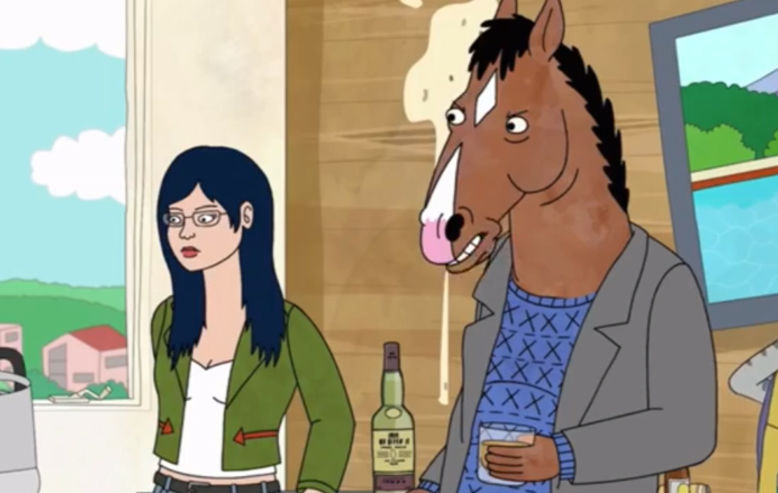This article is from our friends at Trunkworthy
Imagine Mr. Ed as a haunting, sometimes bitterly sad exploration of the grim shadow of unearned fame and you have a sense of this show’s tricky tone and strangely successful alchemy.
The Netflix comedy Bojack Horseman is a seeming paradox: a glib tragedy that manages to eke considerable pathos out of the existential angst and bottomless self-destruction of its title character, a raspy-voiced horse, voiced by Will Arnett. Bojack starred in a Full House-like show called Horsin’ Around in the 1980s and 1990s before descending into an alcohol and drug-fueled decades-long personal and professional tailspin he’s still immersed in as the show begins. Imagine Mr. Ed as a haunting, sometimes bitterly sad exploration of the grim shadow of unearned fame and you have a sense of the show’s tricky tone and strangely successful alchemy.
Bojack Horseman is a show of surprisingly profound superficiality that finds Bojack Horseman trying to make sense of his life while dictating the details of his booze-sodden misadventures to Diane Nguyuen (Mad Men’s Alison Brie), his ghostwriter and an unabashed feminist who finds herself attracted to Bojack despite being the girlfriend and later fiancé to Bojack’s frenemy Mr. Peanut Butter (comedian Paul F. Tompkins). Mr. Peanut Butter is Bojack’s antithesis, a radiant bundle of joy whose relentless positivity is no act: while Bojack luxuriates in boozy self-hatred, Mr. Peanut Butter genuinely seems to love everyone and everything; his enthusiasm knows no bounds.
Bojack Horseman begins on an appropriately irreverent note as a wacky show-business spoof, but it doesn’t take long for it to plumb into darker waters. Bojack reconnects with the child actress who played his daughter on Horsin’ Around(before devolving into a Britney Spears-like whirling dervish of sexual provocation) and tries to make amends with his old partner, Herb Kazazz, who refuses to forgive Horseman for abandoning him after he was outed as gay and dropped from the show. Bojack has seemingly hurt everyone he has ever touched, but he seems to have saved his most intense loathing for himself.
Underneath all the goofy wordplay, visual gags, and irreverence lies a fundamentally serious question: Is Bojack Horseman beyond redemption, or is he too damaged even for an industry that thrives on giving people second chances? Bojack Horseman is consistently funny but is boldly willing to go long stretches without anything approaching gags, to allow the bitterness and sadness of Bojack’s life to really sink in.
MORE FROM TRUNKWORTHY:
 |
 |
 |
| 5 Reasons Iggy Pop Needs To Be A Coach On The Voice. Now. | Enlightened: When Cringeworthy Is Trunkworthy | As Season 2 of Getting On Gets On, We Beg You to Binge-Watch Season 1 |

